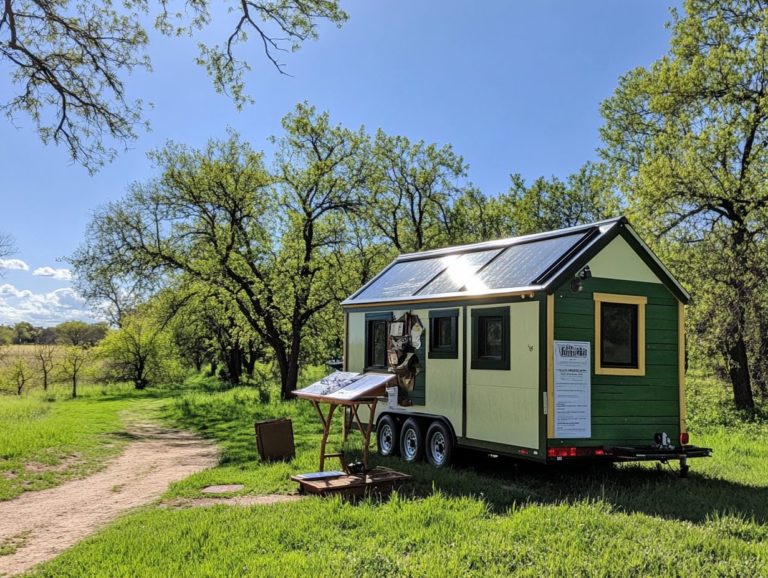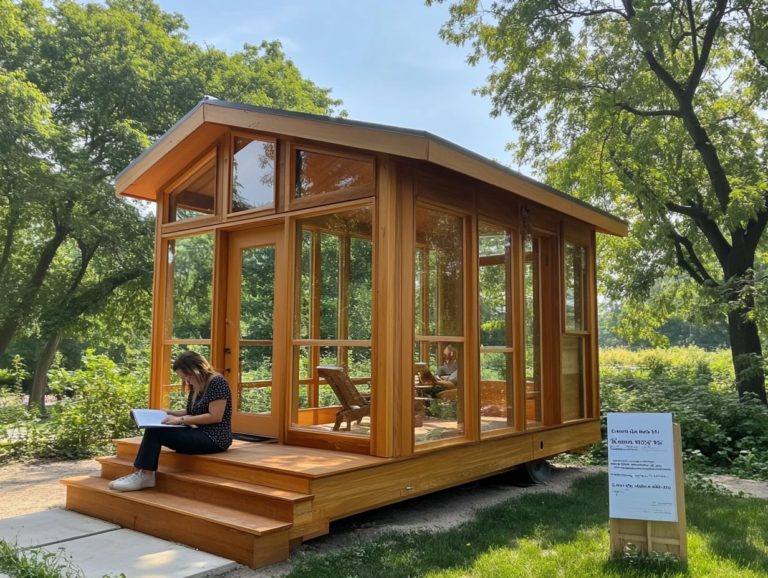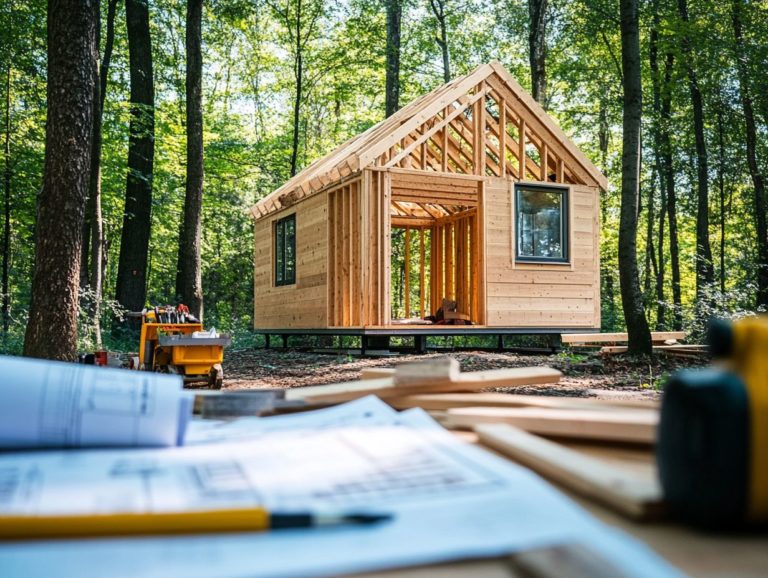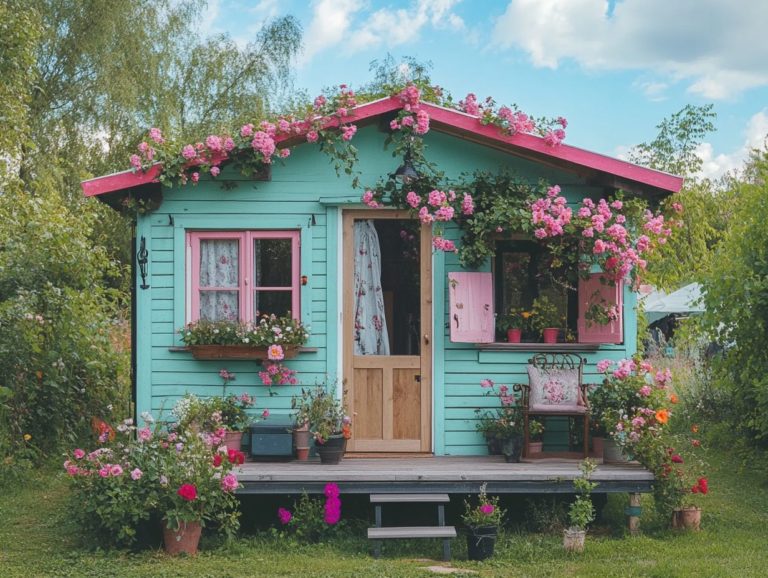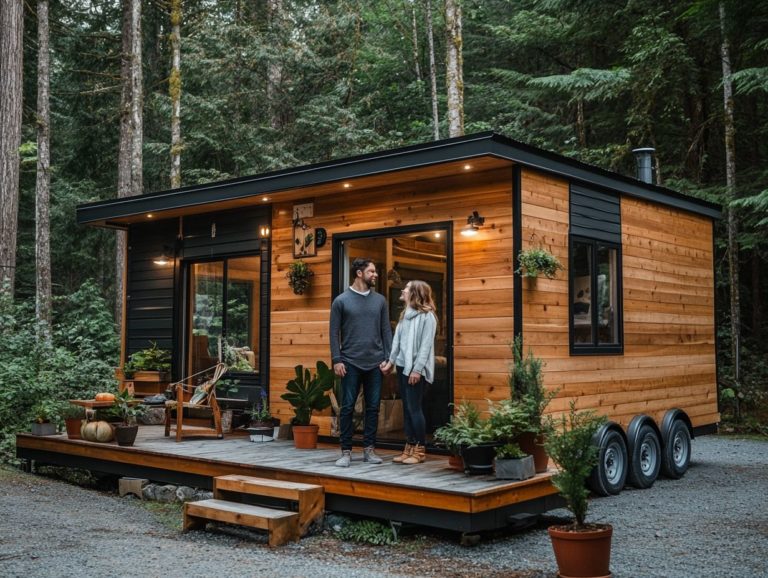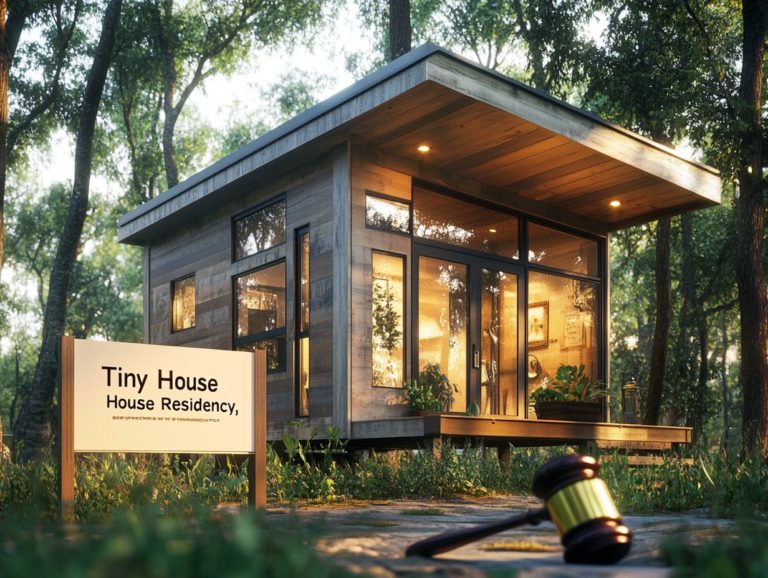Tiny House Construction: Legal Requirements
Considering building a tiny house? You’re in good company! Tiny homes have surged in popularity, celebrated for their minimalistic lifestyle and eco-friendly charm.
Before embarking on your tiny living adventure, it s essential to grasp the legal landscape surrounding tiny house construction. This guide will walk you through critical legal considerations, including zoning and building codes, permits, and inspections.
You ll also delve into the unique characteristics of tiny houses on wheels compared to those built on foundations. Plus, you ll explore alternative living options!
Immerse yourself in this journey to ensure your tiny home dream materializes the right way!
Contents [hide]
- Key Takeaways:
- Legal Considerations for Tiny House Construction
- Building a Tiny House on Wheels
- Building a Tiny House on a Foundation
- Alternative Options for Tiny House Living
- Frequently Asked Questions
- What are the legal requirements for constructing a tiny house?
- Do I need a building permit to construct a tiny house?
- What zoning regulations should I be aware of when building a tiny house?
- Are there specific building codes for tiny houses?
- What are the legal requirements for parking a tiny house?
- Can I live in a tiny house legally?
Key Takeaways:
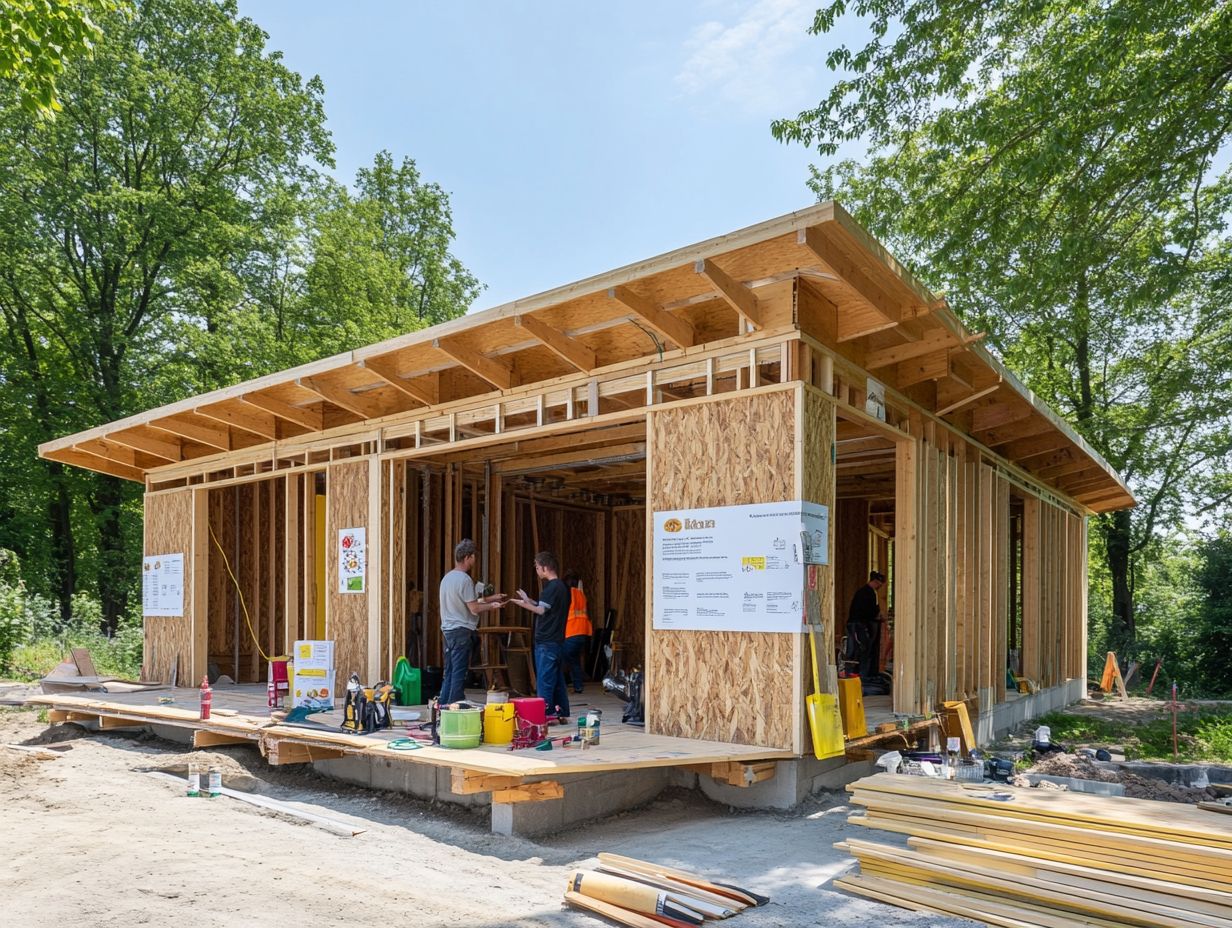
- Zoning and building codes vary by location, including specific city regulations. Research and follow them carefully to legally build a tiny house.
- Obtaining necessary permits and passing inspections is crucial for ensuring safety and compliance with regulations.
- Consider building on wheels for more flexibility, but be aware of special considerations for mobile tiny houses.
What is a Tiny House?
A tiny house is your gateway to a small, efficient living space, typically ranging from 100 to 400 square feet. These homes embrace the tenets of minimalism and sustainability, fostering a sense of community among tiny home owners.
These compact homes, often perched on trailers for easy mobility, offer a refreshing alternative to traditional housing. They tackle pressing issues like housing affordability and space optimization.
For many, choosing a tiny house means letting go of unnecessary possessions and stepping into a lifestyle characterized by simplicity and intentionality. The design of these homes often prioritizes functionality, ensuring that every square inch serves a purpose while reducing clutter.
Living in a tiny house community fosters connections among residents and encourages mutual support and shared resources. By advocating for smaller living spaces, the tiny house movement mitigates environmental impact and paves the way for affordable housing solutions.
This enables you to create a home that resonates with your values and aspirations, reflected in your choice of tiny house guidelines.
Legal Considerations for Tiny House Construction
Grasping the legal considerations involved in tiny house construction is crucial! Understanding building codes, zoning regulations, and federal laws can vary widely depending on your state and locality.
As a tiny house enthusiast, you must deftly navigate the intricate landscape of state and local regulations. These can influence everything from foundation requirements to the minimum square footage needed for a legal residential dwelling. Understanding tiny house zoning laws is crucial in this process.
Zoning and Building Codes
Zoning and building codes play a pivotal role in the legal landscape surrounding tiny houses. They dictate where you can place them and the specific construction standards you must follow as a tiny house owner.
It’s essential to grasp these regulations to ensure compliance with local zoning laws and maintain building safety. This is fundamental for cultivating sustainable tiny home communities.
The requirements for accessory dwelling units (ADUs) are secondary housing units on a property. They can vary dramatically from one municipality to another, showcasing diverse attitudes toward compact living.
In some areas, tiny houses on permanent foundations might be welcomed, while in others, they could be classified as recreational vehicles (RVs). This classification subjects you to more stringent guidelines regarding placement and usage in RV parks or tiny house-friendly zones.
Each jurisdiction has unique stipulations concerning utilities, setbacks, and density. Conduct thorough research to ensure legal compliance while enhancing community acceptance and safety!
Ultimately, this paves the way for the longevity of tiny house living in tiny house communities.
Permits and Inspections
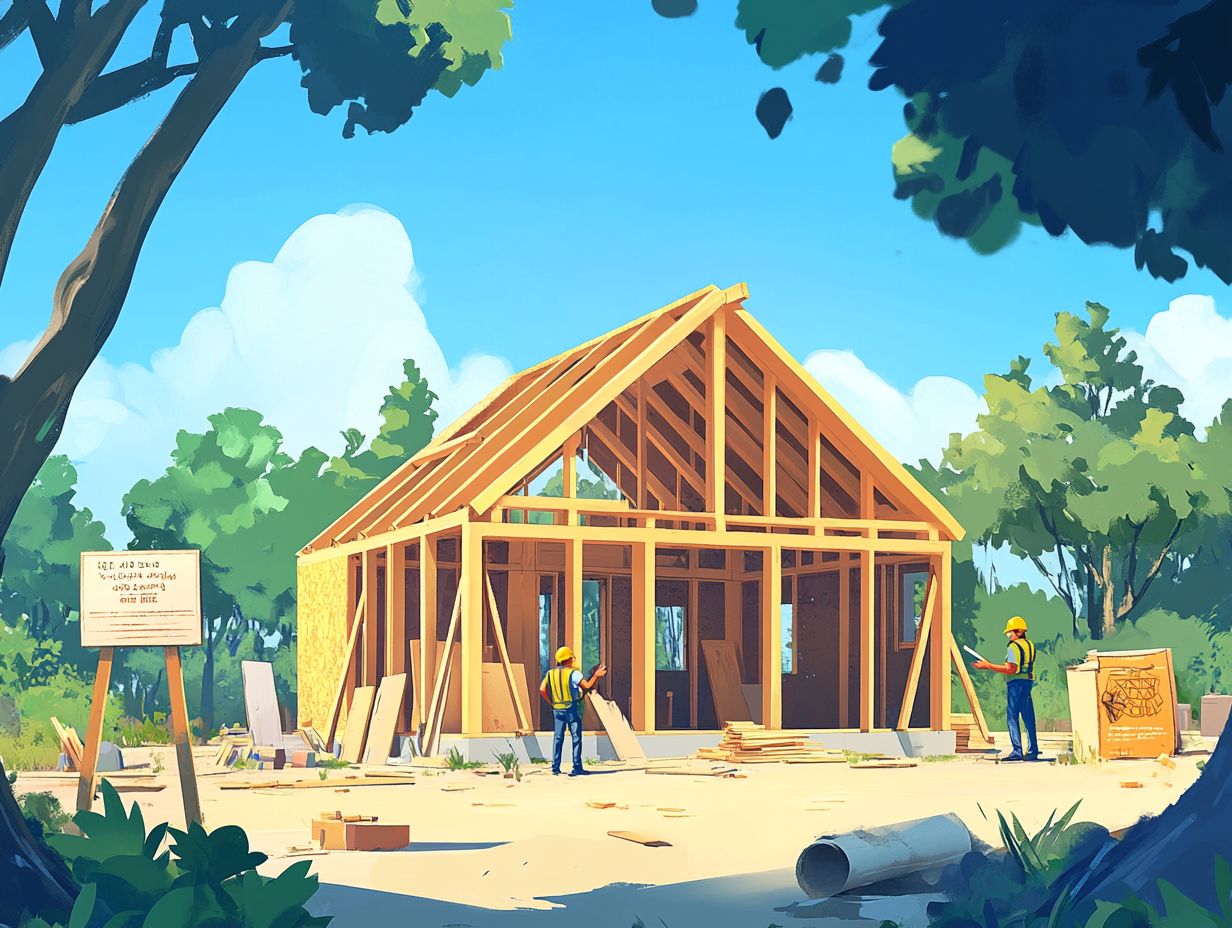
Getting the right construction permits and passing inspections are essential steps in building your tiny house. These steps ensure your home meets all housing codes and local regulations.
As a tiny house enthusiast, work closely with your local municipality to understand the permits needed for both mobile homes and permanent tiny structures, especially in light of state codes and tiny house laws.
Navigating the intricate web of regulations can feel overwhelming. Requirements often differ significantly between tiny houses on wheels and those anchored to a permanent foundation.
It s crucial to understand local rules about where you can place your tiny house and the building codes that apply. Generally speaking, tiny homes built on wheels are often classified as trailers. This classification necessitates a distinct set of permits related to vehicle safety and mobility, which can be subject to property tax considerations.
In contrast, those constructed on a permanent foundation typically require standard residential building permits. These cover essential aspects like zoning, structural integrity, and utilities, ensuring compliance with housing regulations and local codes.
Your local building departments are your best friends in this journey! They offer guidance on compliance with local codes, safety inspections, and the final approval needed for occupancy. Engaging proactively with these departments is crucial to clarify any unique requirements or variations that might apply to your project, particularly in light of differing city regulations.
Building a Tiny House on Wheels
Constructing a tiny house on wheels presents exceptional flexibility and the freedom to roam. However, this lifestyle also brings a unique set of challenges concerning regulations and construction standards.
Such homes are often classified as recreational vehicles or mobile homes subject to state regulations. As a builder, it s crucial for you to navigate the specific codes and regulations that diverge from traditional residential construction.
Familiarizing yourself with tiny house regulations and local zoning laws is essential. This knowledge ensures that your project aligns with all necessary requirements and flourishes in its new environment.
Special Considerations for Mobile Tiny Houses
Mobile tiny houses offer a blend of unique challenges and opportunities. This is especially true when it comes to zoning rules and foundation requirements, which dictate where you can park or construct your home within tiny home communities.
Understanding local laws is crucial to ensure compliance while capitalizing on the flexibility that the tiny house movement provides. This journey can be intricate due to the varying levels of acceptance among municipalities.
Many areas still lack clear guidelines for unconventional living arrangements like tiny houses. Finding tiny house-friendly locations is essential, as some regions impose strict restrictions against them.
Understanding zoning regulations is vital, particularly for new owners who may not yet be well-versed in this legal landscape, heavily influenced by state regulations and local building codes.
Safety is key! Make sure to include emergency exit points to meet building codes and keep residents safe during emergencies.
Building a Tiny House on a Foundation
When you decide to construct a tiny house on a foundation, you’ll navigate a distinct set of regulations and standards. These include local zoning and property tax implications, unlike those for mobile tiny houses.
This method not only offers greater stability but also enhances longevity. It s an attractive option for tiny house enthusiasts seeking a permanent living solution that complies with local housing regulations.
Requirements for Permanent Structures
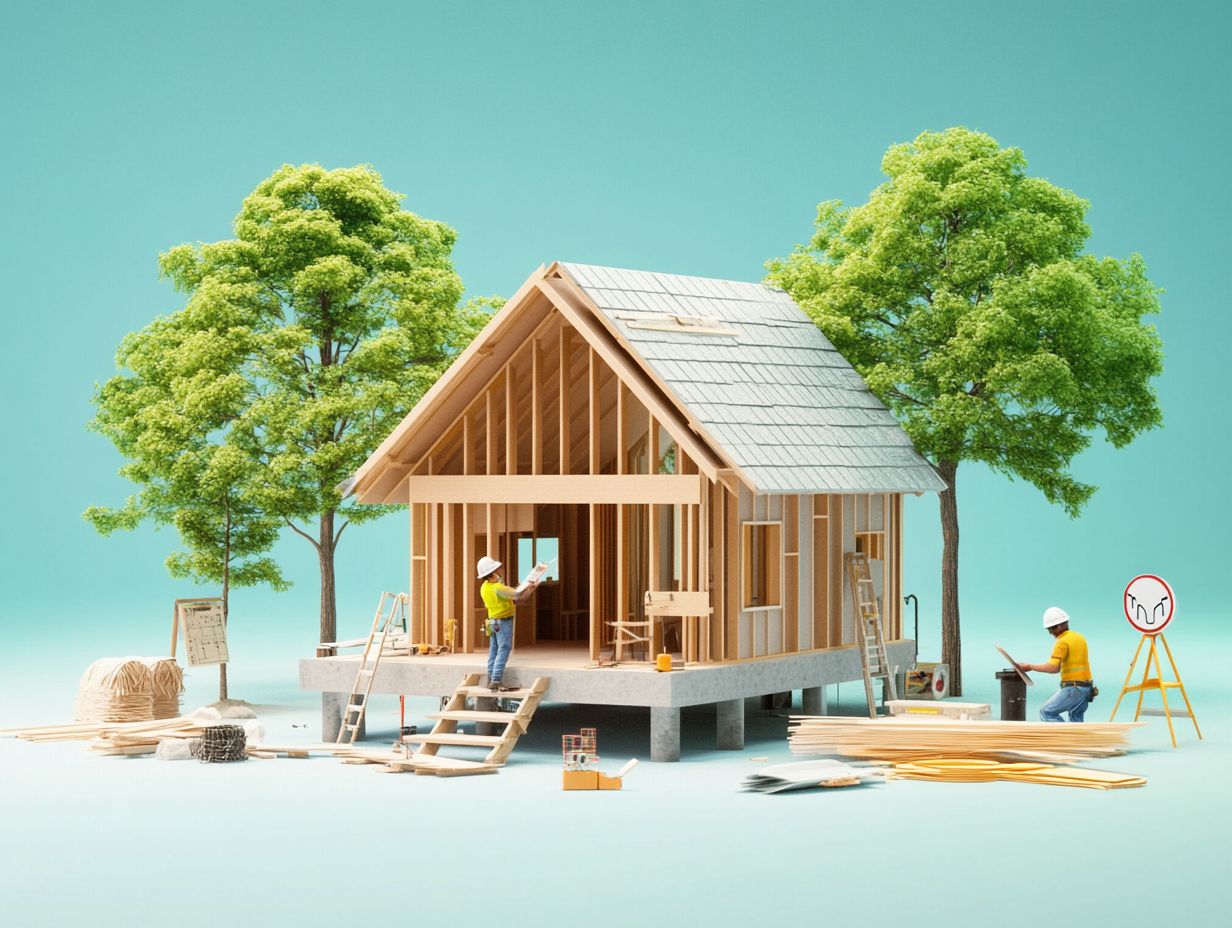
Dreaming of a tiny house? Here are the key requirements you need to know! Building a tiny house as a permanent structure involves specific requirements that vary depending on your location. You must comply with building codes and housing regulations set by local municipalities.
These regulations are essential for ensuring that your tiny home meets safety standards. They cover everything from electrical wiring and plumbing to structural integrity. For a comprehensive overview, refer to tiny house regulations. Regular inspections by local building departments are crucial for maintaining compliance and protecting you from potential hazards.
Zoning laws significantly influence where you can place your tiny house. They determine whether it’s on a private lot or within designated communities. These laws may impose limitations on size and occupancy based on local codes, along with Tiny House HOA rules that you should consider.
By navigating these requirements thoughtfully, you can create a legally sanctioned living space that supports your lifestyle while prioritizing your safety and that of your neighbors, especially in tiny house living neighborhoods.
Alternative Options for Tiny House Living
Exploring alternative options for tiny house living opens up a world of flexibility and creativity in your pursuit of affordable housing solutions. Tiny home communities and RV parks provide various innovative design concepts.
You ll find different types of tiny homes that follow local housing rules and champion sustainable living. This allows you to create a space that truly reflects your values and lifestyle, often within tiny house communities.
Other Types of Tiny Homes and Legal Requirements
Other types of tiny homes, such as container homes and yurts, offer innovative living solutions that can often sidestep traditional zoning and building codes. However, you still need to adhere to specific housing regulations.
Understanding the legal requirements surrounding these alternative structures is vital for aspiring tiny house owners. This ensures that your living environment is both safe and compliant.
Each option brings unique features that cater to different lifestyles and preferences. For example, container homes often use repurposed materials, promoting sustainability while offering exceptional durability.
On the other hand, yurts typically feature a circular design that maximizes space and energy efficiency, making them a compelling choice for those embracing a more minimalistic lifestyle.
It’s crucial for you to research local zoning laws, as these can vary significantly from one area to another. This research helps determine whether these unconventional homes can be legally established as permanent residences or if they are merely suitable for temporary accommodations. Additionally, consulting tiny house legal resources can provide valuable information on navigating these regulations.
Frequently Asked Questions
Here are some common questions about tiny house construction and what you need to know.
What are the legal requirements for constructing a tiny house?
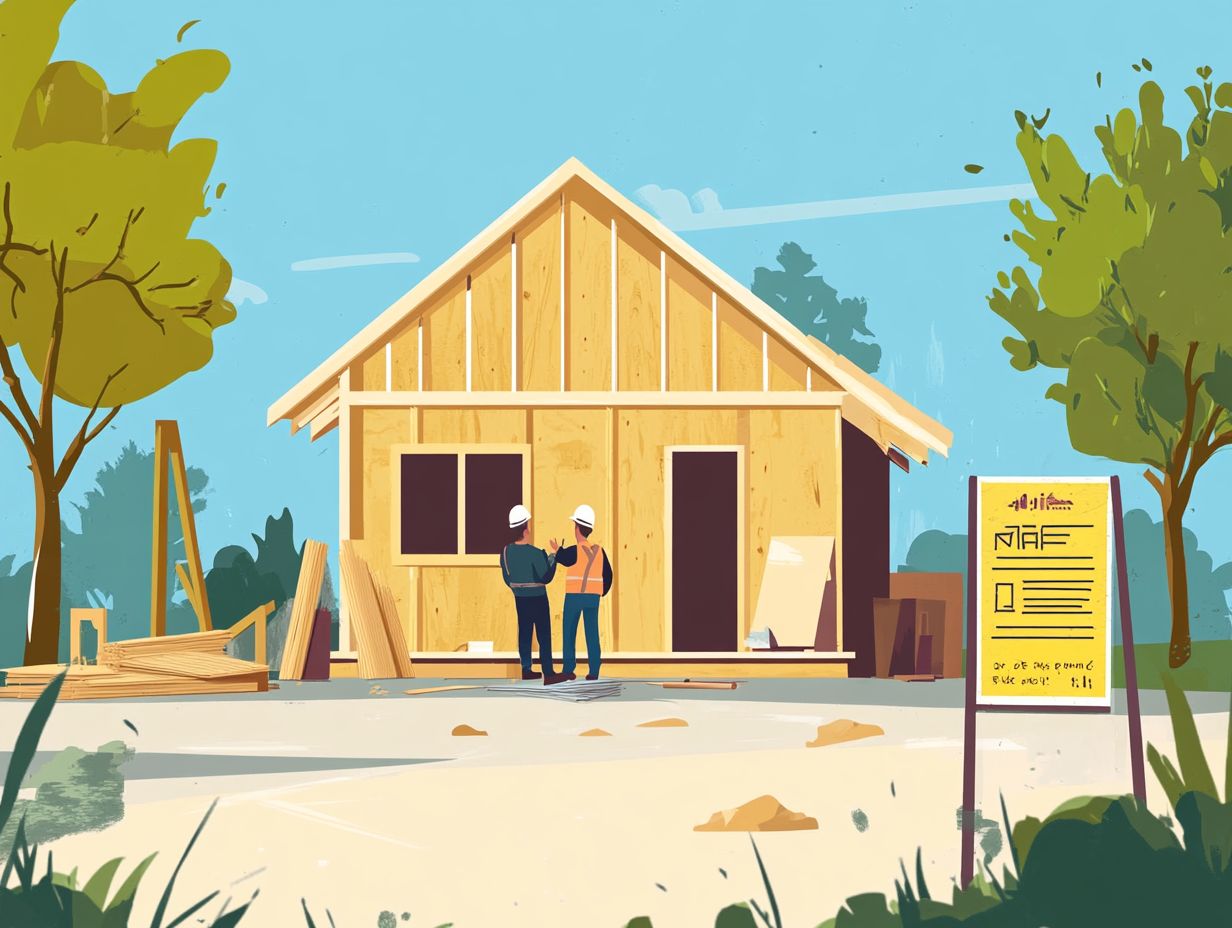
The legal requirements for constructing a tiny house vary depending on your location. It s important to check with your local government to understand the specific zoning, building codes, and regulations that may apply to your tiny house project.
Do I need a building permit to construct a tiny house?
In most cases, a building permit is required for constructing a tiny house. This ensures that the structure is safe and meets building codes. However, some areas may have exemptions for certain types of tiny houses, so it s important to research your local regulations.
What zoning regulations should I be aware of when building a tiny house?
Zoning regulations dictate where you can place a tiny house. Check with your local government to see if it s allowed in your desired location and what specific requirements you need to meet.
Some areas classify tiny houses as accessory dwelling units (ADUs) or recreational vehicles (RVs), which can affect placement options. Different municipalities may also have unique zoning codes that impact your plans.
Are there specific building codes for tiny houses?
Many areas have specific building codes for tiny houses. Research these codes to ensure your tiny house construction is safe and compliant with local regulations.
What are the legal requirements for parking a tiny house?
Legal requirements for parking vary by location. Some areas allow tiny houses on residential lots, while others require them to be in designated tiny house communities or RV parks.
Can I live in a tiny house legally?
This depends on your location. Some places permit tiny houses as primary residences, while others limit how long you can occupy them. Always check local laws and regulations before making a tiny house your permanent home.

